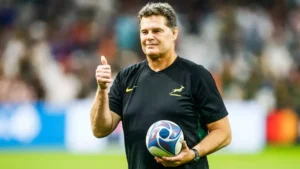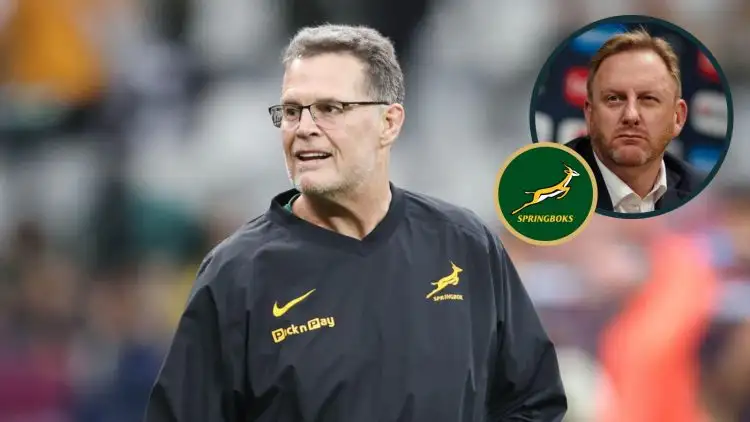Rassie Erasmus has been hailed as a “brilliant innovator” by the boss of World Rugby but urged to work with the governing body to “make the system better” rather than criticise match officials in public.
Erasmus is in Johannesburg, where South Africa kick off the defence of their Rugby Championship crown against Australia at Ellis Park on Saturday.
The two-time World Cup-winning coach divides opinion between those proclaiming his undoubted rugby genius and those unwilling to overlook criticism of referees which fuelled online hate and led to him twice being suspended.

Embrace Rassie Erasmus
Last year, despite leading the Springboks to their first Rugby Championship title since 2019 followed by an unbeaten tour of Britain, Erasmus lost out on the World Coach of the Year award to the sevens coach of France.
“I don’t think Rassie is a big favourite in World Rugby to be honest,” was the blunt reaction of former Springbok star Schalk Burger.
During his time as chief executive of that very organisation, Alan Gilpin has seen Erasmus retain the Webb Ellis Cup. He has also seen the 52-year-old twice banned by the organisation he leads.
Which makes his take on the head coach of the sport’s number one ranked men’s international team, given exclusively to Planet Rugby, worth hearing.
“My personal view is we need to embrace [what Erasmus brings to rugby],” says Gilpin. “I’ve spent time one-on-one with Rassie. We’ve banned him, twice, in my tenure!
“Rassie can be very confronting because he is incredibly passionate about rugby. He is incredibly passionate about what rugby means to the South African public – and his responsibility, as he sees it, in that regard.
“So that’s challenging and confronting. A bit non-rugby like sometimes. But the guy is a brilliant innovator. What a brilliant thinker of the game he is. You want innovators, don’t you?”
There were the traffic light signals sent from the stands during the last World Cup to communicate messages to the pitch. The purposeful infringement from the kick-off against Italy last month in order to secure an immediate scrum. The lifting a player in the air lineout-style during phase play, in the same game, to set up a maul. And so much more besides.
“It’s like early Arsene Wenger,” says Gilpin. “He comes in and says, ‘Actually, why are we doing that like that?’”
The caveat
You sense there is a ‘but’. That in likening Erasmus to Wenger who, during his time at Arsenal revolutionised English football with a focus on fitness, diet and tactical innovation, there has to be a caveat.
“Look,” Gilpin continues. “We would always say to Rassie, and any other coach, you, like any passionate, invested high-performing coach in sport, are incredibly frustrated when you think match officiating or other things have had an impact on your team’s ability to win.
“But you’ve got to work with us on that. Help us make that system better rather than criticising match officials in a way that we know, when coaches or administrators or players criticise match officials, gives the online haters permission to pile in.
“Please don’t do that. Please work with us.
“I think Rassie’s heard that. We’ve had good conversations about that with him, and with other coaches to be fair. And he’s responded positively to that over time.
“Does that all make life for what we do easy? No. But you need those innovators. Rugby needs innovators.”
That much is indisputable. For all the success of the British and Irish Lions tour, on and off the pitch in Australia, the professional arm of the sport is at a crossroads.
Clubs, outside of France and Japan, are sinking in financial debt. The game as a whole is struggling for eyeballs. The proposed R360 global franchise competition is viewed by some as a remedy, but nobody seems able to explain how exactly a travelling circus is going to achieve that.
Whatever else it requires, men’s rugby desperately needs big personalities to help it stand out from the crowd of other sports trailing hopelessly in football’s wake.
Erasmus is a polarising figure but he is box office. World Rugby recognise that. They are absolutely right to explicitly caution against any return to toxic talk and to make clear – to everyone – that abuse of officials will not be tolerated. Enough damage has already been done.
Equally, they get that Rassie, like the Eddie Jones of a few years back, is someone who gets people talking about rugby. And that the sport has probably never needed that more than it does now.
